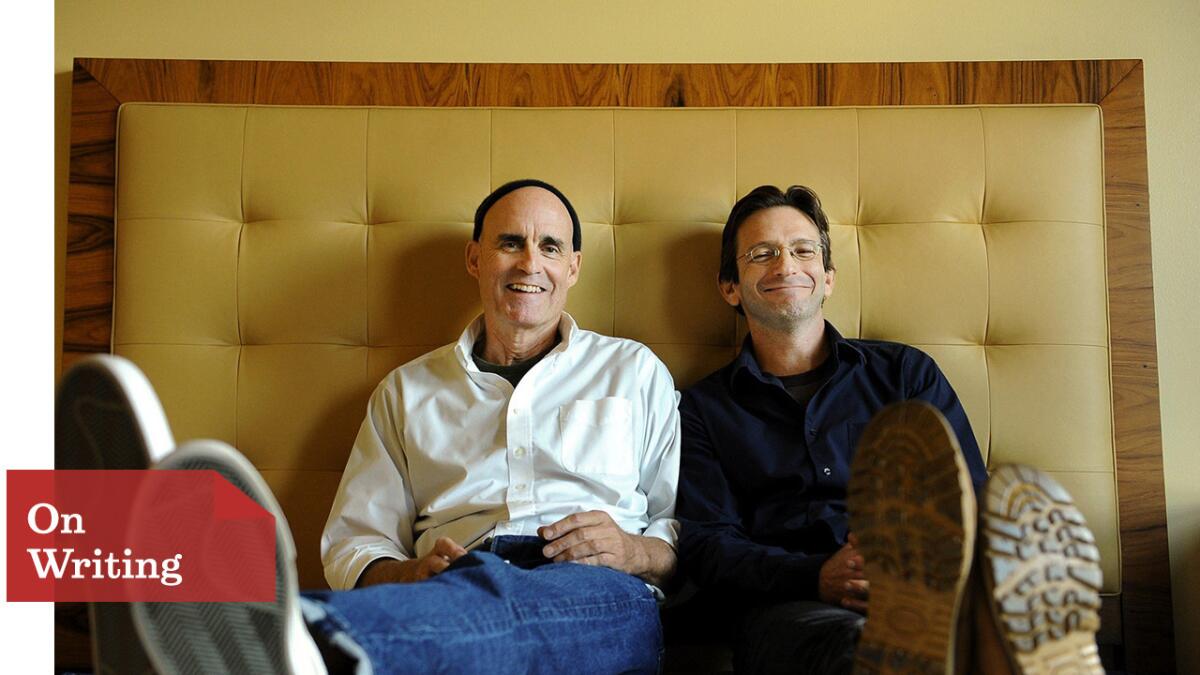‘Foxcatcher’ screenwriters wrestled with getting the characters right

- Share via
When I first sat down with director Bennett Miller to talk about the movie he wanted to make, one of the things that struck me was that “Foxcatcher” was a sports story, but not a sports story in the traditional sense. It was in fact the very mirror image of a sports story.
What begins with two talented brothers and the scion of one of America’s most storied families as they attempt to build a wrestling program good enough to compete at an elite level, slowly but relentlessly moves in the opposite direction, finally creating a toxic environment that will compromise the very things that sports and athletic competition are meant to engender.
Instead of building toward triumph and victory, the narrative begins after Dave and Mark Schultz have both won gold medals at the 1984 Olympics, and from that singular achievement follows a dark and twisted path of power and ambition that ultimately leads not to a podium and the national anthem but to murder and ruin.
In creating the character of John du Pont, I paid great attention to writing dialogue that reflected the real John du Pont’s talent for sounding dull and uninspired. He had authored several books that are full of clichés and platitudes about winning and being a champion, and I used the tone and texture of his own words to build a character who tried hard to inspire people but left them unmoved and often embarrassed.
Where a more traditional sports story might have a parent or coach give a rousing talk before the big game, in this film every line of dialogue that John du Pont speaks is meant to do just the opposite. His words are intended to sound banal and trite, his encouragement meant to appear hollow and self-serving, so that instead of leading his athletes to victory he corrupts their character and destroys their ability to perform. Contrary to what might be expected from a sports story, there are no go-ahead touchdowns, no last-second free throws and no winners in “Foxcatcher.”
— E. Max Frye
A true collaboration
Even though Max and I never sat in the same room together, this script is a true collaboration.
Max’s draft back in 2007 opened my eyes to what this film could and should be. He’d banged the sprawled events of a decade into the rushed two-year run for Olympic gold. More important, he’d laid the structure for what felt essentially like a love story between these three men: Mark and David Schultz, and John du Pont.
Each scene, as I worked on the script over the next four years, through hundreds of hours of discussion with Bennett, then 5,000 more alone at my computer, began to feel to me like its own wrestling match between the characters: a grasping intimacy; a feeling out of weaknesses; an effort to dominate; a submission to the will and force of another.
Both Mark Schultz and John du Pont had enormous resources: one the God-given gift of world-class athleticism; the other all the money one could dream of. But each lacked what they truly wanted: respect. Dave Schultz — magnetic, fatherly and unbeatable on the mat — became the grasped-after source of that respect for both men.
What Dave could bestow: his love, his grace, his approval, his respect. Dave — caught in between these two men and their desires — that’s what this film is for me.
Two scenes are emblematic in my mind: the opening scene of Mark wrestling the leather dummy because, with all his natural gifts, he can’t overcome his own demons, can’t get out of his own way. And Dave negotiating with Du Pont for Mark to be taken care of financially even if he leaves Foxcatcher Farms because Dave seals his fate in that scene. He negotiates Mark’s exit, proving his ultimate lack of respect for Du Pont. The movie can’t but end the way it does.
Lastly, this: I remember my talks with Mark Schultz over the years of writing. I remember his pain, his anger, the — even now — still raw and empty place in him that Dave, his beloved older brother, occupied. I hope we’ve served Mark well with this movie.
— Dan Futterman
More to Read
From the Oscars to the Emmys.
Get the Envelope newsletter for exclusive awards season coverage, behind-the-scenes stories from the Envelope podcast and columnist Glenn Whipp’s must-read analysis.
You may occasionally receive promotional content from the Los Angeles Times.










